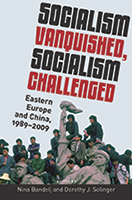
What Would a Hard Landing in China Mean for the World?
Barry Naughton:
Paul Krugman in a recent post (“How Much Should We Worry About a China Shock?” The New York...

Barry Naughton:
Paul Krugman in a recent post (“How Much Should We Worry About a China Shock?” The New York...
The new leadership has signalled it is prepared to tolerate slower growth to move the economy away from export-led growth and towards one driven by domestic demand, with 7 percent annual expansion seen as the bottom line.
...
China needs another round of “decisive measures” to make sure it continues its successful economic growth as its margins of safety are falling amid growing domestic problems, the International Monetary Fund said in its latest report....
As China hopes to reshape its economy to be less reliant on construction and heavy industry, and more reliant on consumer spending, the industries that benefited the most from China’s rise are now being hurt while those aimed at Chinese...
China’s blueprint for economic reform is finally taking shape. The government has appointed a taskforce to draft the plans, ahead of the third plenary meeting of the 18th Central Committee. With the country’s economy at the crossroads, these...
The heavy reliance on state investment produced unintended consequences. Overbuilding of housing created a real estate bubble. The investment a capacity to produce that overshot demand in a variety of areas.
Mr. Xi also said “China will not sacrifice the environment for temporary economic growth” and that officials will be held responsible for pollution “for life.”
Urbanization and comprehensive economic reform are among the main hopes for supporting and improving the quality of China’s growth, as well as for commodity producers and investors globally.

Finally, it seems the railways ministry may soon be restructured as part of a wider exercise by the government to streamline its ministries. Putting railway reform on the agenda of this year’s meetings of the National People’s Congress and the...

Dorinda Elliott:
At this week’s National People’s Congress, outgoing Premier Wen Jiabao proclaimed that the government kept housing prices from rising too fast. Really? I wonder what my 28-year-old Shanghainese friend Robert...
Xiang Songzuo, the Agricultural Bank of China's chief economist says “stabilizing growth is a pre-condition for delivering on reform.”

Socialism Vanquished, Socialism Challenged examines the twenty-year aftermath of the 1989 assaults on established, state-sponsored socialism in the former Soviet bloc and in China. Editors Nina Bandelj and Dorothy J. Solinger bring together prominent experts on Eastern Europe and China to examine the respective trajectories of political, economic, and social transformations that unfolded in these two areas, while also comparing the changes that ensued within the two regions.
Since taking the reins of the Communist Party last month, Mr. Xi has chosen his words—and his symbols—carefully. His first tour outside of Beijing since taking the top job was to Guangdong—which spearheaded China’s economic reforms and was the...
The new Communist leaders must reduce China’s reliance on exports to sustain expansion as the country faces a wealth gap that runs a risk of fomenting social unrest.
It is a move political observers say pays tribute to the famous southern tour of Deng Xiaoping in 1992 and sends a signal of commitment to deepening reform. A Shenzhen propaganda official said Xi, who will succeed Hu Jintao as president in March...
Standard Chartered economist says China's GDP is likely to grow 7% over the next five years without big interim reforms.

Over the past twenty years, economist Zhang Zhuoyuan has witnessed and actively participated in building the nation’s economic policy.
He participated in the drafting of reports at each of the Communist Party’s three previous national...
As China’s 18th Party Congress looms, it is clear that we are now in the thick of transition. The impending transition creates uncertainty about China’s future, but it also opens up new possibilities. Already, the discussion of economic policies...
Since the start of economic reform in the early 1980s, China has experienced plenty of growth and inequality; per capita income has grown nearly 8 percent annually, while the Gini coefficient rose from 0.28 to 0.39. Using a rich longitudinal...
Interest rates in China comprise a mix of both market determined interest rates (interbank rates and bond yields), and regulated interest rates (lending and deposit rates), reflecting China's gradual process of interest rate liberalization. We...
China's growth record since the start of its economic reforms in 1978 has been extraordinary. Yet, this impressive performance has been associated with an increasing regional income disparity. The authors use a recently developed nonparametric...
The main finding of this report is that both the United States and China will run risks as Beijing moves ahead with membership in the World Trade Organization (WTO), but the potential payoffs for both countries are well worth it. It also points...
Between 1979 and 1983, China made the dramatic transition from a socialist agriculture dominated by large collective farms to a more market-oriented agriculture dominated by small family farms. This report describes the experiment’s background in...
Congress will soon consider whether to revoke normal trade relations (NTR) with China and then, possibly in the fall, whether to make NTR permanent as part of China’s anticipated entry into the World Trade Organization. The consequences of...